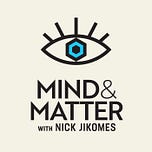Short Summary: A deep dive into the science of oxidative stress, antioxidants, aging, and neurodegenerative diseases like Alzheimer’s.
About the guest: Pamela Maher, PhD is a professor at the Salk Institute in San Diego, California, with a focus on neurodegenerative diseases, oxidative stress, and antioxidants.
Note: Podcast episodes are fully available to paid subscribers on the M&M Substack and everyone on YouTube. Partial versions are available elsewhere. Full transcript and other information on Substack.
Episode Summary: Nick interviews Dr. Pamela Maher about her research on cell death mechanisms, including apoptosis and ferroptosis, and their roles in health and neurodegenerative diseases. They discuss how oxidative stress from reactive oxygen species can damage cells, the body’s antioxidant defenses like glutathione, and Maher’s studies on natural compounds—fisetin, curcumin, and cannabinol (CBN)—that may protect against brain cell loss. The conversation covers CBN’s mitochondrial benefits in aging mouse models and broader risk factors for dementia, like obesity and hearing loss, emphasizing early intervention.
Key Takeaways:
Apoptosis is a controlled cell death process vital for development, while ferroptosis, linked to oxidative stress and iron, causes cells to burst and is tied to diseases like Alzheimer’s.
Oxidative stress arises when reactive oxygen species overwhelm antioxidants, damaging DNA, proteins, and cell membranes, especially polyunsaturated fats.
Glutathione, a key antioxidant, relies on cysteine and declines with age, but supplements like N-acetylcysteine might help, though tolerability varies.
Cannabinol (CBN), a THC byproduct, protects mitochondria and improves memory in aging mice, hinting at therapeutic potential beyond cannabinoid receptors.
Middle-age risk factors like visceral obesity, type 2 diabetes, and hearing loss significantly increase dementia risk, but hearing aids can reduce it.
Maher’s team is refining natural compounds and exploring how they might address both brain and systemic health to combat dementia.
Related episode:
M&M #165: PUFAs in Brain Health & Disease, Dietary Fats, Brain Lipids, Nutrition | Richard Bazinet
*Not medical advice.
Support M&M if you find value in this content.
Episode transcript below.
Episode Chapters:
00:00:00 Intro
00:05:02 Cell Death Pathways
00:10:21 Apoptosis Mechanisms
00:15:10 Oxidative Stress Basics
00:20:23 Antioxidant Systems
00:25:56 Oxidative Damage Effects
00:30:00 Ferroptosis Process
00:35:04 Ferroptosis Triggers
00:40:15 Lipid Peroxidation
00:45:20 Therapeutic Approaches
00:50:30 Natural Products Research
00:55:45 Cannabinoid Studies
01:00:57 Compound Benefits
01:05:18 Cannabinol Effects
01:10:28 Mitochondrial Protection
01:15:07 Mouse Model Results
01:20:09 Clinical Trial Potential
01:25:41 Antioxidant Strategies
01:30:06 Current Research Directions
01:35:00 Risk Factors for Dementia
Full AI-generated transcript below. Beware of typos & mistranslations!
Listen to this episode with a 7-day free trial
Subscribe to Mind & Matter to listen to this post and get 7 days of free access to the full post archives.
















